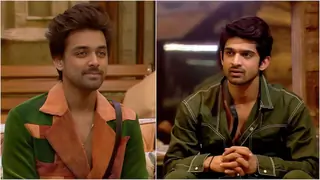At times we even become so defensive and protective of that version of history that we grew up hearing and learning that we are ready to quash all secondary theories without a second thought. We quarrel over the fragments of history we have, we convince each other, we compare theories; yours and mine, that which is shown on our show, discussing in endless ways, going around in circles which is the correct history among these histories, and which is the correct story among these stories echoing from the past which fascinates all of us.
So I thought for a change why can't all of us share our own first experience with historical fiction. There are many stories and histories we hardly know. It would be a learning experience if each of us can share that historical story which influenced you the most. It could be anything; a story from real history, a novel of historical fiction, a historical play, a historical fiction television series, etc.
I will share my first tryst with historical fiction. This novel was first read out to me by my father when I was a small kid. Surprisingly, there are several disturbing sequences in the novel during the initial chapters itself. But my father never edited them out or sanitized them suitably for a small kid. There were portions he left unexplained. But all the same, he read them out. It was the Telugu historical fiction novel, Kadimi Chettu by Vishwanada Satyanarayana on the founder of the Kadamba dynasty of kings, Mayura Sharma.
I have not read the book for more than a decade. So I am purely speaking from memory. There are several details that could go wrong. So bear with me if I unintentionally commit any mistakes. The titular Kadimi Chettu or banyan tree is the place where this entire chain of events is sparked off. The protagonist of the novel is a small toddler, perhaps five years old. He is playing beneath this tree which is there in the compound of his house. It is a happy family of five, a father, mother, elder brother, elder sister and little Mayura.
The danger signal is sounded in the village. His father and brother leave in a huff after advising the women in the family and Mayura to lie low and keep the door locked until they return. Little Mayura innocently asks, "What if you do not return soon and I want to go out and play beneath the banyan tree? Do I have the permission to go out?" The question is left hanging ominously in the air unanswered.
We are then told that their kingdom has been attacked by a more powerful king. Their king has actually fled the kingdom sensing his ultimate defeat if he goes for combat. The citizens have been left to their own devices on how to handle the approaching enemy army led by a very cruel, sadistic and brutal general Bhallatha Varma.
Mayura's father is a Kshatriya and also head of the village council. They decide to give the enemy free passage provided they do not harm the citizens of the village and not engage in combat which would anyway prove to be disastrous to all of them. But things go against this village. The approaching army starts indulging in looting and plundering, killing everyone in sight, raping the women, and killing the children.
The villagers muster up their last bit of resistance but are no match for a trained and brutal enemy army. All the men in the village are dead. The general gives the orders to his soldiers to break down every house at sight, plunder at will, money and women, and kill everyone in that village that had dared to stop his progress. It looks like no other village had offered any resistance to this brutal army even when subjected to several war atrocities and this was the only village which fought back.
Little Mayura wants to go out and see what's happening outside. His mother and sister hardly manage to hold him back when they hear sounds of the door being banged. His mother realizing that everything was over tells him, "All of us are going to play hide and seek with your father and brother and sneaks him out through the backyard of the house to big baskets of rice husk beneath the banyan tree and hides him inside telling him not to come out till his father or brother find him."
Both she and her daughter head inside and try their best to hide beneath the bed. The enemy soldiers break in. They find out where the mother and daughter are hiding and rape both of them before killing them also. All this while little Mayura is observing disjointed images of what is happening inside through a small hole in the basket with a dreadful rage building up inside him. He is about to go out to help his mother and sister when he is reminded of his mother's orders not to come out till his father or elder brother comes to take him.
He starts wondering what was taking so long for both of them to come. That is when the realization that they are not coming because they are no more dawns on him. The reality of death takes this tiny toddler by storm. Even at this young age, he has the ability to be cool and collected in adversity and plan his moves methodically.
He realizes that his mother did all this to save at least him. He knows that he is no match for the powerful general and his soldiers. He tells himself that he cannot lose the life his family sacrificed so much to save by throwing it away foolishly by confronting the enemy soldiers for whom he was no match now.
The holocaust of destruction that has hit his village blows away. He comes outside once the enemy army has left. He sits beside his mother and sister, his eyes red and bloodshot, and not a single tear in his eyes. He vows to destroy the person, the enemy general who had left their whole village as a mass cremation ground, at all costs. He promises to himself that he would let the tears flow from his eyes on that day when he kills him. If he lets the tears flow today, his anger would be dissipated. He vows to keep this anger and rage safe in his heart.
But again, he realizes how futile his revenge is. He is a nobody while his enemy was the most powerful general and greatest warrior of his times. What realistic chance did he have to accomplish this revenge. That's when he remembers his father' words, "To make a bigger line shorter without rubbing it, you have to draw one beside it even bigger than the previous one!" Little Mayura had found his way to accomplish his vengeance. He vows to become that second bigger line which will erase the first big line.
I know all these chapters or portions in the novel sound very disturbing. But that was the reality of those times. I never felt that any of the portions in the novel were unnecessary or unconnected to the original theme.
Mayura grows up in a Brahmin household under kind adoptive parents belonging to a Brahmin Agraharam. They come to the village after hearing of the war atrocities on this particular village. They even brave social ostracisation and choose to bring him up as their own son as they esteemed his father a lot for his generous and charitable ways.
Finally everyone in the Agraharam relent after hearing the sorry story of the little boy that they will accept Mayura as his adopted son provided they are not expected to sit in the same pankthi with him, and he does not officiate annual ceremonies of their ancestors. Hence he gets the Brahmin family name of Sharma though he is a Kshatriya by birth.
Mayura stays with his adoptive parents as a very dutiful son. But their only sorrow is that he disappears without notice for months together and when he returns, they find the kind of wounds or cuts on his body that we usually find on one who is undergoing serious warfare training.
One day, unable to hold himself any longer, his adoptive father asks him, "Whatever happened with your original family happened long back. Though it is very deplorable, we hear such things in time of war. We expected that you would get over things and move on with time. But that never happened. We feel that you are going away from us farther and farther. You are our only child. Is it too much if we expect you to be safe, secure and happy? I am too old and weak to bear the news of harm to my only son!"
Mayura reassures him telling that he would keep himself safe and emerge victorious in his revenge. He could not give up his revenge for anything, not even their love. He tells,"That day changed me forever! I might have been different and led a very different kind of life if that day had not happened. I did not choose either the deaths that happened or this life of mine. Destiny chose me for it. I was saved so that I could avenge all those who died that day. One can run away from duties and responsibilities but not from one's destiny. I hope you too will not want me to forsake it."
After this his surrogate parents understand him and willingly allow him to go and fulfill his destiny. We learn later that all this while Mayura had been working in the same army as that of the general Bhalatha Varma who had killed his family. He actually works under BV's superior general.
That particular post is familial for the services rendered by their ancestors to the king's ancestors. This superior general doesn't like BV's ways or methods. He feels that BV is becoming too ambitious for his own shoes. This man actually dreads that BV will become the Army chief with his death because he happens to be childless. He wants to prevent that from happening at all costs. He feels that only his presence is preventing BV from engaging in an open mutiny against their king and staging a military coup.
Mayura cleverly ingratiates himself into the good books of this general. So much so that the general thinks of adopting him as his own son after seeing his bravery and valor. I really cannot do justice to these sections in the novel to the brilliant way in which Mayura manipulates this great general without the least bit of compunction for the feelings of this aging warrior.
In the scenes where we find him ruthlessly plotting and playing the old man like a Stradivarius violin, we see him assuming a darker shade of grey. Throughout the rest of the novel, he is at a lighter shade of grey. But it is grey always. He never becomes the perfectly whitewashed hero with a golden aura around him. But I loved the protagonist just the way he was. I never thought the less of him for some of his devious later actions.
So according to the tradition, Mayura becomes the Army Chief of that kingdom. BV rebels against the king on loosing the coveted post to a novice like Mayura, as he considers him. The king is greatly rattled because he knows how horrible this man can be. Mayura reassures him telling him to leave it between the two of them and keep himself out of harm's way for a few months. He promises to eliminate BV completely from the face of earth.
Mayura brags about this to a number of army officials who are favorable towards BV before retiring to his former village which he has made into his strong hold. He expects that his words will infuriate BV into launching the offensive against him.
All this while Mayura had been planning for this. He trains all the citizens including women and children to fight like a well-trained army. The moment they feel they are losing, they are instructed to retreat to several strong holds he has built in the forests and caves on the hills.
BV's style of fighting itself is rattling his enemies with his brutality and war atrocities and cowing them down into submission out of fear. Mayura's blitzkrieg attacks and retreats unnerve him. He finds whole villages and villages, right from women to small children, in his path fighting pitched battles to perfection from their house roof tops one instant and suddenly vanishing the next instant when he thinks that he is gaining the upper hand with a completely empty village.
By the time BV reaches, only one tenth of his original army has survived. BV realizes that he is terribly over numbered and invites Mayura to one-to-one combat to prevent casualties. BV thinks that he has tricked Mayura into accepting this challenge while the truth is the other way round.
Mayura had schemed for this one to one combat all along. He could have attacked BV on his way here itself and defeated his army. But if he had done so, BV might have escaped. So Mayura wanted to tighten the noose around BV's neck by allowing him to come till his stronghold systematically and exponentially decreasing the strength of the army with which BV set out initially.
The sword duel between the two begins beneath the banyan tree. BV is at his attacking best while Mayura mainly concentrates on just parrying his attacks and defending himself and biding for his time. Hours pass, BV starts tiring. He starts making mistakes in his cuts and thrusts.
That is when BV realizes a bit too late that he had been expending all his energies and stamina in a reckless fashion while his enemy had been conserving his energy and stamina all along playing the defensive game for this very moment. Mayura now launches his offensive counter attack slays BV with one last heave, cut and thrust just like cutting a rotten banyan tree whose branches and supports have all been cut one by one before cutting off the main trunk.
In his dying moments, Mayura tells BV the reason why he killed him and how. He tells him how this revenge took 20 long years in reaching him but how it surely reached him. To complete his enemy's quota of misery even during his dying moments, he thanks BV for his own success in life that had come at the cost of his enemy, BV's failure.
So this was my first tryst with historical fiction. I don't know if I have been able to recapture the magic of the original text in all these pages. I don't know how much of this is history and how much is story. But the effect of this text on me has always been magical. So I have shared my favorite his-story with all of you. You too must be having one like this to narrate. I don't want just likes. Please do share your favorite historical fiction story with me.




















